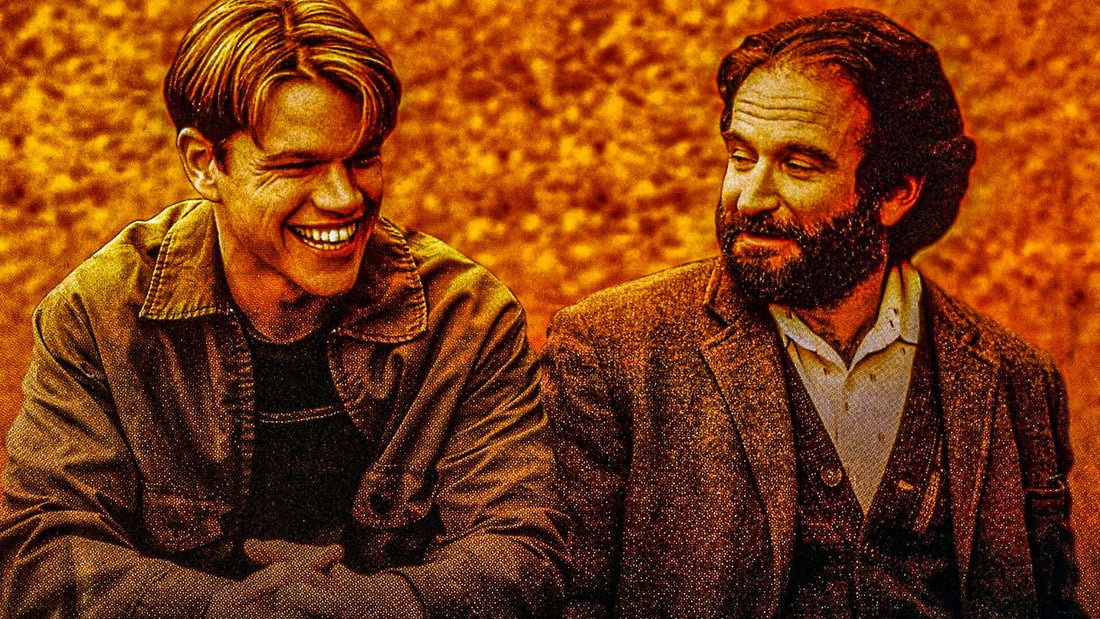
Unpacking the Timeless Appeal of Good Will Hunting: A Cinematic Masterpiece on Self-Discovery, Resilience, and Human Connection
Share
In the vast landscape of cinematic breakthroughs, Gus Van Sant’s Good Will Hunting remains a timeless classic. Released in 1997, it introduced the world to Matt Damon’s raw talent (and Ben Affleck’s—maybe) and showcased Van Sant’s quiet brilliance as a storyteller. The film’s enduring popularity lies in its compelling narrative, authentic characters, and universal themes—but there’s something else, too. Something harder to name. A kind of emotional residue that lingers long after the credits roll.
At the center is Will Hunting, a janitor at MIT with a gift for mathematics and a past he can’t outrun. His genius is discovered by Professor Gerald Lambeau (Stellan Skarsgård), who tries to guide him toward a brighter future. But it’s the relationship between Will and his therapist, Dr. Sean Maguire—played by the late Robin Williams—that forms the film’s emotional core.
Matt Damon’s performance is extraordinary. He navigates Will’s contradictions—intellectual brilliance, emotional volatility—with a kind of quiet clarity. The screenplay, written by Damon and Affleck, earned them an Academy Award. Their off-screen friendship bleeds into the film, giving the portrayal of brotherhood a lived-in authenticity. It feels like a tribute to something real.
But it’s Robin Williams who steals the film. His portrayal of Sean Maguire is layered, restrained, and devastating. He blends humor with grief, wisdom with weariness. The scenes between Williams and Damon are charged with something deeper than performance. They feel like two people trying to find the edge of themselves. The film challenges us to see the gap between who we are and who we pretend to be. And for those who’ve felt that divide, the story hits hard.
Good Will Hunting doesn’t just tell a story—it holds up in a mirror. Everyone struggles with their past. Everyone carries demons. Most of us want to let go, but don’t know how. The conversations between therapists and patients strip away pretense. They reveal the human condition in its rawest form. Van Sant balances that emotional weight with moments of levity. The dialogue is sharp, the one-liners memorable, and the intimacy between characters pulls us in.
At its core, the film is about self-discovery, resilience, and the power of human connection. We like to believe we’re self-aware, that we’ve braved the depths and come out better. But most haven’t. Will’s journey—from avoidance to acceptance—resonates because it’s aspirational. It reminds us that our past doesn’t define us, and that growth is possible if we’re willing to do the work.
The soundtrack deepens the film’s emotional tone. Elliott Smith’s “Miss Misery,” along with four other tracks, adds a melancholy undercurrent. If you know Smith’s music, you know what that means. His inclusion isn’t just aesthetic—it’s thematic. The soundtrack, like the film, has endured.
Over the years, Good Will Hunting has become a cultural touchstone. It sparks conversations about mental health, trauma, and the pursuit of meaning. It’s stayed with me like a pebble I picked up on a walk—something I held onto without knowing why, until I did.
One Halloween, years ago, my girlfriend convinced me to go to a costume party, and I didn’t want to. I wandered the aisles of Goodwill, uninspired, until something clicked. I started picking items at random—one from every section—and taped them to my clothes. I slung a crossbow over my shoulder. That night, people kept asking, “What on earth are you supposed to be?” I smiled and said, “Well, I’m ‘Good Will Hunting,’ of course.”
The film’s staying power comes from its honesty. Its performances, its dialogue, its themes—they all point to something real. Good Will Hunting reminds us that connection matters. That growth is possible. That the human spirit, when given space, can surprise us.